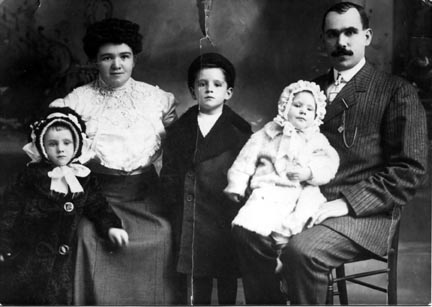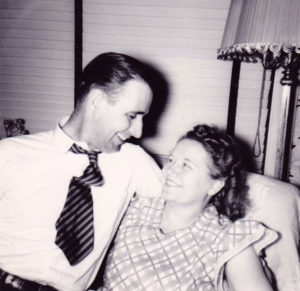My maternal grandfather was born in Chicago in 1906. To some family members, that may be a surprise since he said he was born in 1905, and every document but his baptismal record and his father’s naturalization papers, says so. I’m not sure why he chose to change his age, although I suspect it had something to do with getting involved with an “older” woman, my grandmother, who actually was born in 1905.
He was the oldest of three children born to Irish immigrants, Annie McHugh and Felix McHugh (no known relations) and raised in a very traditional, Irish Catholic home. Unfortunately for him, he learned heartache at an early age when his mother died in 1913. His father remarried a few years later, but his stepmother was no replacement, and from what I understand, their relationship was often strained.

As a teenager, John was sent off to a Missouri seminary prep school with the intention of becoming a priest. Something (or someone) changed his mind after he returned home to Chicago, where he met a cute little Polish girl from the South Side, Marie Maciejczak, when they were both working in the same downtown department store. He used to tell us how he would take two street-cars and a bus from the North Side to get to her on the South Side. It was controversial in his family who said he should be seeing a nice Irish girl, not a Polack. But if there’s one thing we all know, John McHugh was Irish through and through, and thereby his stubbornness would keep him courting that little blonde girl until she married him. That happened on on October 24, 1928.
At first, in the early days he worked as an elevator operator, and as a streetcar conductor for the CTA. Their first child was my mother, who arrived 10 days before the stock market crash of 1929; a second came almost exactly two years later. Surviving the depression with two small children wasn’t easy, but he did his best. He told me stories about it, such as how after the gas company came and turned off the gas because they hadn’t paid the bill, he simply went outside and turned it back on when the man left. “What was I supposed to do?!” he said.
In what was likely both an attempt to ensure supporting his growing family and a (perhaps stereotypical) dream, he enrolled in the police academy and joined the Chicago Police Department in 1935. This hard and honorable work is what would define him for all who knew him.

In 1945, now with three daughters, he became a detective, working primarily larceny cases. He had some great stories that he would tell about his experience on the force, like how he never—in all his 27 years—had to fire his gun at anyone, and he was proud of that. Although, there was one day it almost happened. While they were tracking down some guy in an old building grandpa came around the corner, holding out his gun in front of him and he saw a man at the other end of the hallway pointing a gun at him. He almost pulled the trigger, before he realized it was a mirror and he was seeing his own reflection.
One case truly identified the type of cop he was. He and his partner believed that an innocent man had been arrested, tried and jailed for an armed robbery. So they continued to investigate the crime anyway, despite their being urged not to do so, and eventually found justice. A small article in the Chicago Tribune covered it.
In 1962, he retired from the police department and went to work at Otis Elevator. I’m not sure when he completely retired, as he was always someone who needed to keep busy, and even after leaving Otis he did small part-time jobs at a few places. One of his most favorite hobbies was fishing. In the mid 1930s, his brothers-in-law introduced him to fishing in Minnesota. Starting sometime in mid 1940’s, he began taking trips up there, almost annually, mostly to the same lake and cabin resort, although a few times elsewhere. It became a tradition for the whole family, his children and grandchildren, until the place closed in 1984.

Round Lake, Aitkin Co., Minn., 1973
I was fortunate to have a special trip up to Minnesota with him when I was a senior in high school. It was just him, my cousin Danny and my aunt Kathy. The four of us spent a cold, rainy week, and hardly caught a thing. It felt pretty miserable at times, the weather kept us locked up indoors mostly. But I remember it fondly as a special time with him. On the trip home I discovered how much he loved my grandmother, who had recently been diagnosed with Alzheimers. It was just the two of us in his car and he was talking about how he was looking forward to getting home to her, and how wonderful she was and how much he loved her. He was practically in tears as he talked about her. It was truly touching.
And then, because he was in a hurry, we got pulled over for speeding in Wisconsin. Grandpa didn’t think cops should be spending their time waiting by the side of the road for someone driving too fast, when they could be doing other, more important things. So, when he opened his wallet to get his driver’s license, his retired Chicago policeman’s badge was conveniently in full view, prompting questions, chat, and we drove off with a “Well, you drive safely” and no ticket.
In the 1980s he spent more and more time having to take care of grandma. It was a horribly difficult job, and to help him with it, the two of them moved in with my family. I had just gone away to college, so some remodeling was done to make room for them, and they settled in where my mother could help with some of the care. Over the next few years, Marie eventually became too debilitated to be at home and she needed around-the-clock care. Reluctantly, she was moved to a nursing home.

John, Marie and daughter Anne.
He would visit her every single day over the next few years, except when he himself was too sick to leave the house. Many days she would hardly know who he was, and he was heart broken.
He died November 20, 1988. His wife outlived him by four years.